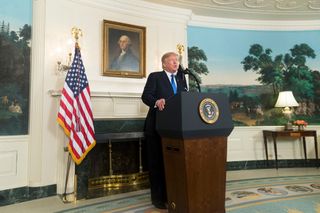Deal! Agreement Would Allow Government to Re-Open--'Temporarily'

The President and Congress have struck a tentative deal to re-open the government, which means FCC staffers can return to the full-time job of policing the airwaves and wires.
The President Friday (Jan. 25) announced the agreement on a short-term (three-week) continuing resolution (CR) that would allow the partially shutdown government to re-open temporarily as early as late Friday (Jan. 25), day 35 of the impasse over border security funding.
The compromise must still pass both Houses of Congress and be signed by the President, who in a "deal, no deal" moment in December refused to sign a previous, similar, continuing resolution that had been supported by congressional Republicans and that would have kept the government open.
But President Trump had said that he would support a reasonable compromise to get the government open. The CR does not appear to include any money for the wall/fence, so the "deal" was being billed as a presidential "cave" by CNN and others.
In a televised Rose Garden address carried live by the broadcast and cable networks, the President said that he still had a powerful alternative--declaring a national emergency and building a wall at the border--but said he did not want to use it "at this time."
The President thanked all the government workers and "citizens of our country" and said that all employees would receive back pay "as soon as possible."
He said there was an agreement on both sides that a fence or wall would be an important part of border security and that a conversation would begin about funding. He called the CR a chance for all to work together for the benefit of the nation. He also suggested that the deal to reopen the government would have to be followed within those three weeks by a deal on barrier/wall/fence funding. He said the country was building "smart walls," a term that allows for the inclusion of tech as well as brick and mortar.
Broadcasting & Cable Newsletter
The smarter way to stay on top of broadcasting and cable industry. Sign up below
The President said if he does not get a fair deal in the next three weeks, however, the government will shut down or he will use his emergency powers.
Senate Majority Leader Mitch McConnell (R-Ky.) praised the President's announcement and said that, with cooperation, the compromise CR could pass Friday. Senate minority leader Chuck Schumer (D-N.Y.) said he expected the CR to pass the House Friday and be signed by the President.
The reopened government means the FCC can start reviewing mergers again, at least for the next three weeks, and legal staffers will get paid for preparing the net neutrality oral arguments scheduled for Feb. 1.
But the FCC's Jan. 30 public meeting will not return to its previous busy agenda. The FCC signaled this week that whether the government re-opened before the meeting or not, the agenda had been scrapped, except for announcements--new staffers, interns exiting--that usually occupies a few minutes at the end of meetings. The FCC is required to hold a monthly meeting, so it will just be a pro forma exercise in compliance.
The agreement takes the steam out of the planned Jan. 29 #ShutDownTheWall national day of action aimed at forcing the government back open, though the resolution expires in three weeks (Feb. 15), so it is probably a good idea to store the signs.
An agreement means the Jan. 29 State of the Union address could be back on. House Speaker Nancy Pelosi had shut down the address saying it would not happen from the House Chamber until the government was up and running.
J. David Cox Sr., national president of the American Federation of Government Employees, was not ready to pop any champagne over the temporary deal. “While reopening the government is long overdue, I will not celebrate a temporary reprieve to a politically motivated crisis that has left many federal employees in anguish over how to pay their bills, feed their families, and keep a roof over their heads," he said. "Over the next three weeks, Congress must pass full-year appropriations for all government agencies as well legislation to make all affected federal employees whole. We are also urging Congress to act to prevent the use of shutdowns from ever occurring again.”
Contributing editor John Eggerton has been an editor and/or writer on media regulation, legislation and policy for over four decades, including covering the FCC, FTC, Congress, the major media trade associations, and the federal courts. In addition to Multichannel News and Broadcasting + Cable, his work has appeared in Radio World, TV Technology, TV Fax, This Week in Consumer Electronics, Variety and the Encyclopedia Britannica.

